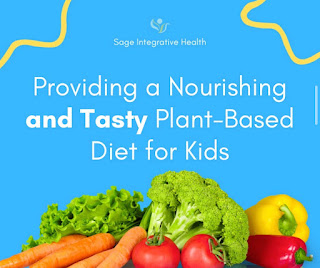A Comprehensive Guide to Providing Children a Fully-Nourishing Plant-Based Diet
Raising children on a plant-based diet can be a healthy and ethical choice, but it requires careful planning to ensure they receive the necessary nutrients for optimal growth and development. With proper attention and informed decisions, a plant-based diet can offer numerous health benefits for children. Let's explore how to create a well-rounded and nourishing plant-based diet for your little ones.
Balancing Macronutrients:
The foundation of a child's plant-based diet should be centered around the delicate equilibrium of macronutrients, including carbohydrates, proteins, and fats. Achieving this balance is pivotal for their overall well-being.
- Carbohydrates: Carbohydrates are the primary source of energy for children. Ensure their diet includes a variety of whole grains such as brown rice, oats, and whole wheat. These not only provide energy but also deliver essential vitamins and minerals.
- Proteins: Protein is indispensable for muscle development and overall growth. Plant-based sources like beans, lentils, tofu, and quinoa are excellent choices to ensure an adequate protein intake for your children.
- Fats: Healthy fats are essential for brain development. Incorporate sources like avocados, nuts, seeds, and plant-based oils to support your child's cognitive growth.
Micronutrients Matter:
While macronutrients lay the foundation, micronutrients are the building blocks of health. These vital nutrients are equally crucial for your child's well-being.
- Vitamin B12: This nutrient, vital for brain health and blood formation, is primarily found in animal products. Since plant-based sources are limited, consider incorporating fortified foods such as plant-based milk, cereals, or supplements under the supervision of a healthcare professional.
- Calcium and Vitamin D: Supporting bone health is crucial. Fortified plant-based milk, calcium-set tofu, dark leafy greens, and nuts are excellent sources of calcium. Vitamin D, which aids calcium absorption, can be obtained from sunlight exposure or fortified foods.
- Iron and Zinc: Plant-based sources of iron include lentils, beans, spinach, and fortified cereals. Enhance iron absorption by pairing these foods with vitamin C-rich options like citrus fruits. Zinc, essential for immune function, can be found in legumes, nuts, and whole grains.
- Omega-3 Fatty Acids: Ensure your child receives essential omega-3 fatty acids for brain health and development by including foods like flaxseeds, chia seeds, walnuts, and considering algae-based supplements.
Snacks and Treats:
Choose whole-food snacks like hummus with veggie sticks, whole-grain crackers, and fresh fruit. Limit sugary treats and opt for occasional healthier alternatives.
Consultation with a Healthcare Professional:
It's essential to collaborate with a pediatrician or registered dietitian when transitioning children to a plant-based diet. They can assess nutrient intake, recommend supplements if needed, and monitor growth and development.
Conclusion:
A well-planned plant-based diet can provide children with all the essential nutrients they need for healthy growth and development. By ensuring a variety of nutrient-rich foods, consulting with healthcare professionals, and making informed choices, parents can nourish their children with a balanced and complete cruelty-free diet, setting them on a path towards lifelong health and well-being.



Comments
Post a Comment